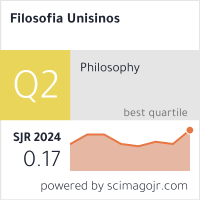Los Los libres no discriminan
La libertad verdadera-metafísica en el estoicismo y su plausible vinculación con la no-discriminación y la antidiscriminación
DOI:
https://doi.org/10.4013/fsu.2025.263.03Palabras clave:
Estoicismo, ética de la virtud, libertad metafísica, (anti)discriminación.Resumen
La concepción estoica de libertad “metafísica” nos indica que ésta es una característica de la persona virtuosa y, por ende, de la persona que posee felicidad (eudaimonía). Argumentamos, empujando la antigua concepción estoica de virtud (areté) hacia las concepciones político-morales contemporáneas, que quien es virtuoso y posee la mencionada libertad metafísica, necesariamente, nunca discrimina y siempre tendrá un comportamiento antidiscriminatorio. Proponemos, por ende, que aquellos que son discriminadores y/o fomentan la desigualdad y/o la discriminación se encuentran en una esclavitud metafísica. Planteamos que la causa de la discriminación, siguiendo al estoicismo, radica en equivocadamente considerar a ciertas cuestiones como “bienes” y en desarrollar pasiones con respecto a estas cuestiones. Es decir, la discriminación se origina por no reconocer que sólo el actuar virtuosamente posee valor.
Descargas
Métricas
Descargas
Publicado
Cómo citar
Número
Sección
Licencia
Derechos de autor 2025 Francisco Miguel Ortiz Delgado

Esta obra está bajo una licencia internacional Creative Commons Atribución 4.0.
Concedo a revista Filosofia Unisinos – Unisinos Journal of Philosophy o direito de primeira publicação da versão revisada do meu artigo, licenciado sob a Licença Creative Commons Attribution 4.0 (que permite o compartilhamento do trabalho com reconhecimento da autoria e publicação inicial nesta revista).
Afirmo ainda que meu artigo não está sendo submetido a outra publicação e não foi publicado na íntegra em outro periódico e assumo total responsabilidade por sua originalidade, podendo incidir sobre mim eventuais encargos decorrentes de reivindicação, por parte de terceiros, em relação à autoria do mesmo.










